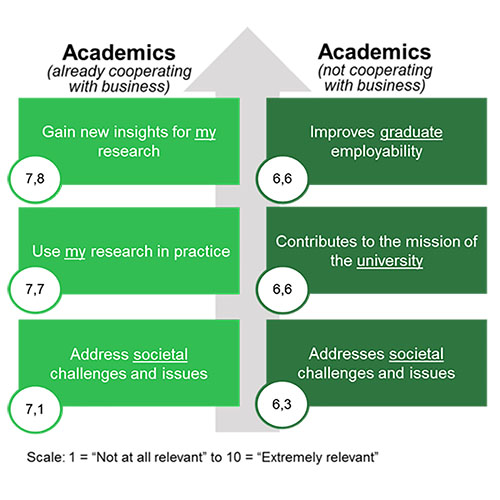Motivations For Academics To Cooperate With IndustryMarch 20, 2017 |
 Dr. Victoria Galan Muros, academic researcher at S2BMRC, and Todd Davey, Director for International projects at S2BMRC, provided some important insights into academics’ motivations for cooperation. Their work is part of the recently completed State of European University-Business Cooperation (www.ub-cooperation.eu), executed for the European Commission. A specific question about motivation was posed to both academic who do cooperate, and those who do not cooperate with business and the results were highly enlightening.
Dr. Victoria Galan Muros, academic researcher at S2BMRC, and Todd Davey, Director for International projects at S2BMRC, provided some important insights into academics’ motivations for cooperation. Their work is part of the recently completed State of European University-Business Cooperation (www.ub-cooperation.eu), executed for the European Commission. A specific question about motivation was posed to both academic who do cooperate, and those who do not cooperate with business and the results were highly enlightening.Motivations predict behavior[1] and the motivations for university-business cooperation have been a much-discussed topic in practical and policy forums the world over as well as in scientific literature. The questions so often asked include ‘how can we encourage academic and business people to cooperate more’ and ‘what motivates the different stakeholders to cooperate? With often vastly differing opinions expressed. Academics who do cooperate with business:
The top three motivations for both groups show this difference in motivations: Question: How relevant are the following motivators for you to cooperate with business?  Upon closer examination, European academics who do cooperate (refer to the words underlined), nominate their first two motivators as personal ones, related to their research, and the third to contribute to society. Contrastingly, academics who do not cooperate perceive the top motivations for cooperation to relate to themselves or their research (one of the primary factors in academic career progression), but with potential benefits for other stakeholders (graduates, the university and society). So how can this help us to encourage academics to cooperate? Greater recognition of how cooperation with business provides research insights and outcomes Regarding the research motivation of collaborators, when academics engage with business in joint research or undertake research focused on solving complex and multidisciplinary industry problems, this frequently occurs at the edges of different disciplines. The ‘unlikely’ mix of disciplines is exactly where innovation occurs, and therefore it is highly likely that the research results are novel in some way. With more innovative research, there is increasing evidence that shows how university-business cooperation result in a higher number of academic publications[1], which are also of higher quality[2], creating superior and more authoritative research performance measured through journal citation rates and citation lifetime[3]. However, these potential benefits are unknown to most academics, who might still not see a clear purpose for cooperating. Aligned with the results of previous research by Tartari and Breschi (2012)[4], the results highlight that ‘the expected benefits from collaboration are not clearly perceived by all researchers’ and that ‘academics who are not already involved in industry collaborations fail to recognize the potential opportunities of engaging with industry’ (p. 1139). Promote the potential benefits to academic research from cooperation Effectively, the results suggest that HEI management and knowledge transfer professionals need to emphasise and educate about the benefits that can come from collaboration with industry. Knowledge transfer professionals should also guide academics in the process of finding the appropriate industry contacts and deciphering how academics can gain new insights that makes their research more innovative and successful as well as defining some concrete research outcomes for the academic from the collaboration. Generally, the focus should be on ensuring that the academics feel that they receive some personal benefits that motivate them to cooperate. How to ensure those outcomes is a topic for another blog post in a few weeks! In Europe, the State of European University-Business Cooperation study shows that academic motivations for cooperation with business are related to research insights and its practical application, but each country, region and individual HEI could be different. For more information visit us on our UBC blog, LinkedIn or Twitter. References: [1] Jones and Clulow 2012, Van Looy et al. 2006, Breschi et al. 2007, Gulbrandsen and Smeby 2005 [2] Abramo et al. 2009, Beaver 2004, Zucker and Darby 1996 [3] Jones and Clulow 2012, Abramo et al. 2009, Beaver 2004, Zucker and Darby 1996 [4] Tartari, V. & Breschi, S. (2012) Set them free: Scientists’ evaluations of benefits and costs of university- industry research collaboration. Industrial and Corporate Change, 21(5), 1117-1147. |